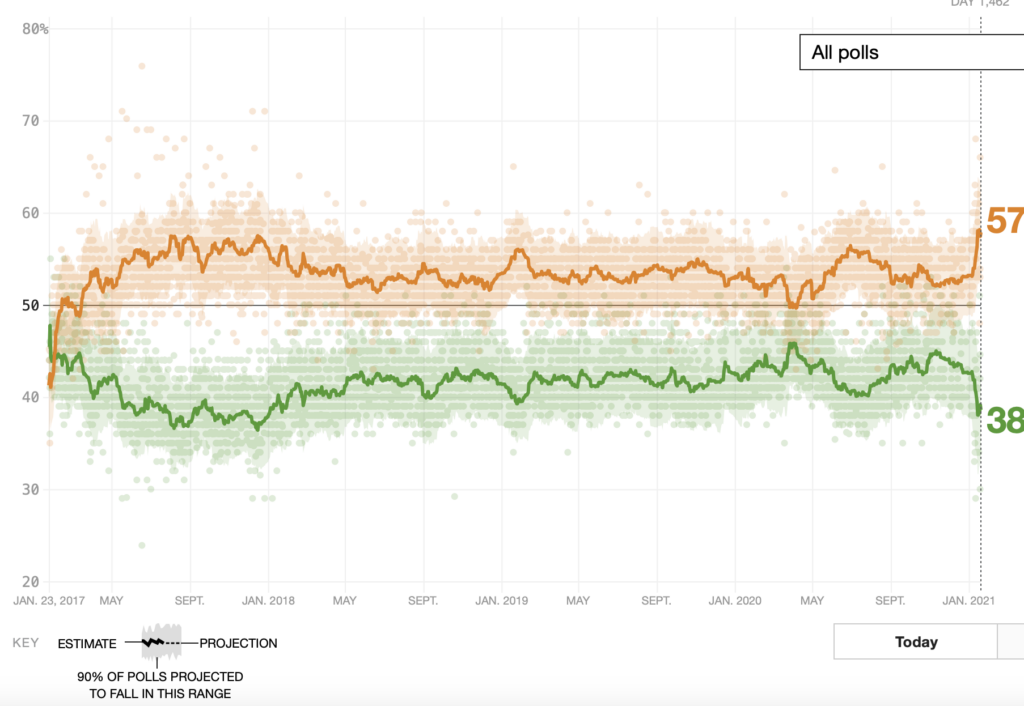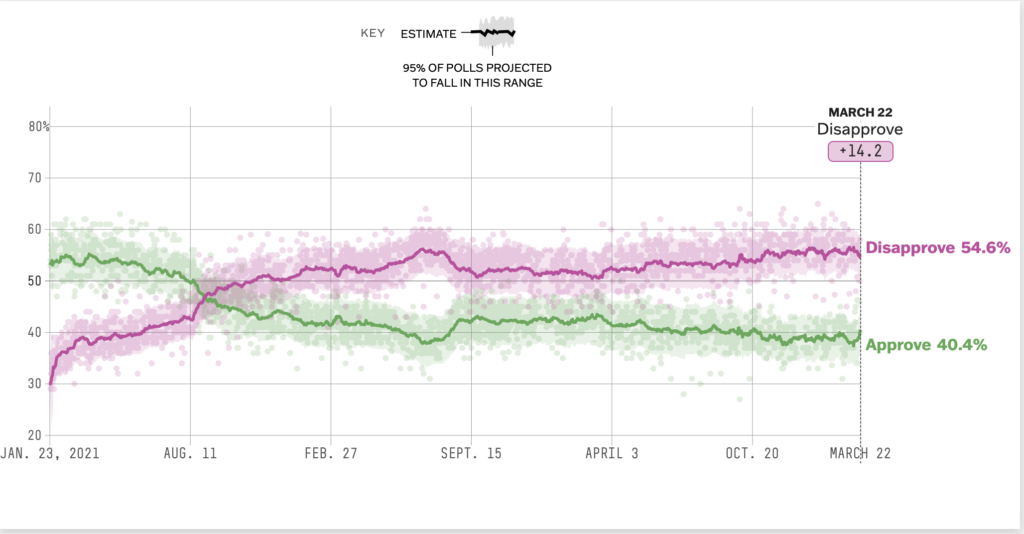A Glimmer of Hope

One of the more frustrating, if not gut-wrenching, aspects of the possibility that Donald Trump will return to power is that his most likely route to do so is, like his first go at the White House, with minority support. That is: more voters will prefer Biden, but the mechanism of the Electoral College will allow Trump to win anyway.
We know that Trump lost the popular vote in 2016 by 2,833,224 votes and in 2020 by 7,052,045. Note that in the Gallup poll, he never hit 50% approval (Last Trump Job Approval 34%; Average Is Record-Low 41%):

And, of course, the broader selection via 538:*

There is little empirical evidence that he can command majority support. The only concern in that regard is that some recent polls do have him at 50%-plus.
As such, the real precarity of this present moment is that a minority of the electorate can return Trump to power. It is, in my view, a profound flaw in our system that the most powerful members of the government can be elected in such a fashion. Nevertheless, that’s how it works. We all know that it is how he came to power in 2016, that that was his route in 2020, and it is his likely pathway in 2024. Thousands of voters in a few states can give him the Electoral Votes he needs, plain and simple.
By the same token that means, however, that if a relatively small number of Republican partisans can be persuaded not to vote for Trump (or not to vote all) then that enhances the chances of his defeat.
This is why I find at least some hope in things like Pence’s unwillingness to endorse Trump or in stories about utterly indefensible things he says. Yes, I agree, that they will have little effect on MAGAites. They will not even persuade the general Republican electorate who prefers a candidate with an R by their name as opposed to a D (for reasons that are not as irrational as readers here may like to think).
As such, I think it important to remind ourselves that while X event, Y utterance, or whatever is not going to change the minds of MAGAs, or even of most Republican voters, that doesn’t have to be the goal. The goal is try and get enough people to understand the problem and threat of Trump so that places like AZ, MI, PA, and WI go for Biden the way I anticipate that the country as a whole will go in November.
So, to be clear, I am not saying that Trump can’t win (see: 2016). I am not even saying that he can’t win the popular vote (but I think it to be highly, highly unlikely). But I am saying that I would advise against dismissing the steady trickle of stories that give some hope that a handful of voters here and a handful there might change their minds (e.g., via CNN: Lisa Murkowski, done with Donald Trump, won’t rule out leaving GOP). Or, that things like Trump Salutes Insurrection ‘Hostages’ won’t matter.
There is also the clear financial troubles Trump is experiencing, the undeniable distractions of his various trials, and his bizarre gutting of the RNC.
All of this only has to matter at the extreme margins in key locations.
Note, I am also not playing the 2016 game that the Never-Trumpers will save us. I am simply saying that he does do and say a lot of things that may be enough to create something closer to 2020 than to 2016 (especially if the third party vote is more like 2020 than 2016).
Note, too, it is only March and while for those of us who pay attention, it feels like this campaign season has been going on since late 2019/early 2020, for the normals out there, it really hasn’t even begun yet.
Just some late Sunday morning thoughts from a decidedly not normal.
Time to go work in the yard.
*And yes, before someone says it, Biden isn’t knocking out of the park, either. But in contrast to Trump, he was able to win the popular vote in 2020, and he has at least demonstrated the ability to surmount 50%, even if his current numbers are terrible.







Not mere distractions, he is obligated to attend criminal trials, even Bragg’s (NY, hush money) which possibly starts in April.
The one thing I hope goes off without a hitch will be his acceptance speech, live hopefully, at the RNC convention in July. People and the media will pay attention, and it could be a revelation. So I hope nothing interferes with that.
Yep. I hate to even start believing these omens, but they do persist, don’t they? Trump consistently lost 10-20% of voters in GOP primaries, sometimes to people who were no longer even in the race. We don’t need to convert a single MAGAt. We don’t even need the never-Trumpers to vote for Biden, we just need them to stay home.
Trump will bleed the RNC which will leave GOP candidates entirely dependent on their own fundraising efforts. Biden has a lot of money and has yet to even hit the airwaves. Democrats love to despair, but what they need to do is hope. We can beat Trump, we can take back the House, and if Murkowski is serious, we might even just barely hold the Senate.
The Big Unknown for me is abortion. Will women (and men) take the issue seriously enough to vote on it. If they do, hell, we could flip Florida and/or Texas.
I saw an interview with a voter, recently, who was complaining about the economy. She went on to say she will vote for Trump because “he’s a businessman.” Letitia James and Barbara Jones will be doing stuff that might puncture that particular balloon.
@Michael Reynolds:
A lot of states will have abortion protection initiatives on their ballots, so yeah, it will be an issue.
The demographics, mainly who is moving there, say FL will just get redder and redder. TX, not so much, the younger cohorts of Texans are already pretty blue.
I actually saw someone make a case the other day that Biden could win the EC while losing the popular vote.
Now, the moment most people hear this hypothesis, they’re likely to dismiss it as absurd before they’ve even listened to the argument. The gist of it comes from looking at the 2022 results, where–contrary to the conventional wisdom–polls were pretty spot-on when it came to the national vote. Where they failed most dramatically was in a number of high-profile races in the key 2020 battleground states.
I looked at the data myself. On RCP, the final generic ballot showed Republicans with a 2.5-point advantage. They ended up winning the national House vote by 2.8 points. However, in the six key battleground states (PA, MI, WI, NV, AZ, GA), RCP underestimated Dems in every single Senate and gubernatorial race, by over 4 points on average. The error was nearly 6 points in the Rust Belt states, the largest being the nearly 10-point underestimation of Gretchen Whitmer.
The GOP’s ability to flip the House was based largely on their overperforming in non-swing states, especially New York.
Part of what drove the “red wave” narrative was the assumption that even a small Republican advantage in the generic ballot would translate to far more gains than a mere 9 seats, due to the Republican skew in the House. That’s been the case in most congressional election cycles in the modern age. In 2022, however, there was an unusual level of consistency between the popular vote and the results. The Republicans won 50.6% of the popular vote, and they acquired just two more seats than that percentage in the chamber. It was the closest seat-to-popular-vote ratio in over two decades. In plain English, for all the talk of Dems getting screwed by gerrymandering, the 2022 House results were overall a pretty accurate reflection of how Americans voted.
That’s not to say the GOP didn’t underperform. It’s just that the underperformance wasn’t equally distributed across the country: it was concentrated in the presidential swing states.
Why did this happen? I’ve tended to think it was reflective of how the political impact of Dobbs played out. Voters in swing states and even some red states had real concern they could see their reproductive rights taken away. Those in blue states may have been outraged by the decision, but didn’t have the same skin in the game. Or at least they were less likely to think they did–which is why talks of a national abortion ban are only going to exacerbate the problem for Republicans.
I’m not saying the midterms should be taken as absolutely predictive of what happens in the presidential election. But for what it’s worth, if we assume the accuracy of the current polls are similar to how they were in 2022–accurate nationally, underestimating Dems in the presidential swing states–then Biden winning the EC but losing the PV (especially if third parties are a factor) becomes a serious possibility.
Just a couple of points.
Then the Biden campaign should work really hard to win the vote that actually matters for winning the election, which – as I keep repeating every chance I get – doing whatever is necessary to win the swing states.
Like most of our recent elections, this contest is likely to be played near the 50-yard line. Yes, no one expects Biden to win over MAGA voters – he needs to win the swing, cross-pressured, and marginal voters without pissing off the lefty base enough that they vote for Jill Stein.
I think this really understates things.
2016 was rare in that two candidates were not popular and had near universal name recognition. At the time, IIRC, they were the two most unpopular major party candidates to run for President in the history of polling.
This year, we have that 2x. Universal name recognition, two incumbents, both with even less popularity than the 2016 candidates. It’s crazy that we are running two candidates who struggle to get a favorable rating above 40%.
To me, that represents a huge unknown in this race. What will people, the so-called “double haters” that currently represent almost a fifth of the electorate, do? Even if the vast majority of them vote for who they voted for last time, it doesn’t take a huge shift to be decisive one way or the other, as we’ve seen in 2000, 2016, and 2020. This is why, understandably, Democrats are particularly angry at third-party runs this cycle.
@charontwo:
The MAGAs will keep on believing that Trump is a brilliant businessman because he keeps telling them he is, and Trump never lies. They also believe that James and Jones are persecuting Trump for political reasons, again because Trump says so.
Trump is the only honest politician we’ve ever had. Ask any MAGA.
There was a minor social media exchange after Trump asked if people were better off four years ago. Biden’s team posted some video response I did not watch.
I thought the question was weird, because four years ago marked the pandemic lockdowns. Who were the angriest people? Trump supporters.
What does it mean? Beats me. I know, I know. Party identity. Cognitive dissonance. Whatever. I still don’t know what it means. But something tells me it matters.
@Andy:
This, in itself, is a rather strong indictment of the status quo, I would say.
An elected government should represent the will of the voters, not the will of the swing voters (or the voters in the swing states).
Again, since the SOTU:
Biden, 8 swing states, 17 events, 17 cities.
Trump, 2 states (one swing, GA), 2 events, 2 cities.
How long before the narrative that Trump is much more vigorous than Biden starts changing?
I’ve been bullish on Biden for over a year, and the data has been moving my way the last two months. It’s been incremental, but anyone paying attention can see the trend. The more people realize it’s now a binary choice, and the more Trump speaks, the better Biden’s numbers will be.
Bookmark it.
@drj:
The difference is overhyped. Most Americans of all backgrounds want security, liberty, and prosperity. The Biden coalition is glued together by overlapping concerns and desires. Many pundits in and since 2022 underestimate how strong that glue is, especially anger at forced birth extremism and revulsion at MAGA chaos.
So the idea there is a zero sum game that necessitates Biden needs neglect this group and go after that group instead is predicated on a false dichotomy. Not everything is a competition. No two people agree on everything, but gettable voters for Biden and Democrats largely share the same goals, no matter where they are.
This year, Democrats will not be focused on flipping Trump voters. Democrats will be working to increase turnout among the types who already reject Trump and/or already voted Democratic in 2020 and/or 2022 — persuading them to endorse Biden’s leadership, embrace American values, and thus vote against Trumpism.
Somebody on Twitter came up with the absolute best name for Trump:
DON POORLEONE
@Michael Reynolds: Yes although framing as converting MAGA puts this in the wrong framing – MAGA staying home is one factor, but in the key locations as Pr Taylor evoked conversions on the margin – the free floaters need not be extremely numerous
I think this is the most important observation
@Kylopod:
I am not sure I follow the argument, but will say that I think this is unlikely. But I will also say it might be the best possible long-term outcome, as that is probably the only way we are going to get rid of the EC.
FWIW, I noted this was likely the case back in April of 2022: A “Fairer” Map for the 2022 House?. Also FWIW, I usually try to point out to folks that gerrymandering is not the main problem, the main problem is to be found in single-seat districts themselves (as I discuss in the post and other places as well).
@Andy:
I think that the 2016 analogy on goes so far.
The easiest reason to say this is that 2016v actually produced a Trump win and a Trump presidency, which I think a lot of third party voters in 2016 didn’t think was likely. They behaved differently in 2020 and I think will ultimately behave more like 2020 than 2016.
I also think that the dislike for HRC was of a different quality than the dislike of Biden, but I am don’t have time to outline my full position, which I will admit is somewhat impressionistic.
@Andy:
Also, I am increasingly not convinced this is an accurate description of politics. We like to pretend like it is all about margins at the moderate middle, but I don’t think we have evidence that actually shows that those swing voters are actually homogenous, let alone moderate necessarily.
@DK:
It wasn’t overhyped in 2016.
@Kurtz: I think Trump was riffing off Reagan in one of the debates with Mondale. From what I can see Reagan serves as the same sort of purpose the Bible does for political evangelicals. When it serves their needs, it’s the Word of God; when it doesn’t, it’s just another book. In the same way, when he serves the needs of the GQP, he’s Reagan–Founder of Modern Conservatism; when he doesn’t, he’s just another RINO.
@EddieInCA:
I would only add that Trump has never shown himself able to deal well with pressure and the legal and political pressures are only going to mount on him between now and November. I think the odds favor a public emotional crash for Donald in the coming months.
@Steven L. Taylor:
An unreprsentative anamoly indeed, with barely 40,000 swing state votes seperating 2016 being remembered as a conventional election vs what we got. But as you just mentioned, this is likely due more to a few swing state voters per precinct staying home because they thought Trump was so awful he couldn’t win — not due to some yawning gap in the values and priorities of swing state voters and everyone else.
Now do 2020, 2012, 2008, 2004…
@DK:
(…and to a few others sitting out or voting Trump after Comey’s last minute interference “raised questions” about Hillary.)
@Kylopod:
I don’t take issue with the analysis provided, I just don’t see how the numbers work. Solidly “blue” states–NY, CA, MA–have high populations, and even red states have high population centers that are blue. This urban vote volume is why Republicans don’t win the popular vote, and haven’t for almost 20 years. I don’t really see anything in the current trends that would flip that on its head.
@Jen:
Without knowing the approach the analyst took, it’s hard to say much about their intention. But if they are using a probabilistic model, it may explain why they would make that case.
If the model gives a <1% chance of an event, they would be unlikely to attempt an explanation. But if the output is higher, say well into double digits, I could see how it would be beneficial to look at those instances to try to figure out why the likelihood is higher than is intuitive.
If not, your guess as to motivation is as good as mine.
I don’t think I’ve ever claimed that voting a straight R ticket is irrational — nor do I recall seeing that claim from other commenters. People vote for the R (or against the D) because they think the R’s are working toward their goals or in accordance with their values. That’s perfectly rational.
The problems arise in two ways — what exactly are those goals and values, and are they correct that the R’s are a better bet than the D’s to achieve them? In recent times, consistent R voters have split into several overlapping groups, some of whom are beyond reach and some of whom might not be:
* people whose primary/only goal is to make abortion illegal
* people whose primary/only goal is to protect wealth and its privileges
* people whose primary goals involve white supremacy
* people whose religion requires imposing conformity on non-adherents
* people whose primary goals involve restricting immigration
* people whose primary goals involve suppression of nontraditional gender identities and sexuality
* people whose primary goal is to pay as little tax as possible
* people who want blue collar jobs to come back to the US
* people who want the stock market to thrive
* people who want goods and services to be as cheap as possible
* people who want to hide the unpleasant parts of US history from their children
* … etc.
The people with deplorable values are right that R’s have their back — they are being perfectly rational. Ditto for the tax haters, and the wealth protectors.
The people who think R’s will be better for jobs/prices/the economy are misinformed, and could presumably be brought around with the right arguments. And the people who think that R’s will do something about the border situation need to have their faces rubbed in the fact that a bipartisan bill to do more than just something about the border situation was just shot down — by Donald Trump. That has to be Talking Point One from now until November every time an R raises the subject.
@CSK: On his bonding company problem: “He maka an offer…everybody refuse.”
@DK: And you do 2000,
Ultimately, if your point is that the EC tends to trend with the popular vote, you are correct.
But, likewise, the notion that the electoral contest isn’t largely contained within the swing states would also be incorrect.
@drj:
The system has always been this way, and it’s not changing anytime soon. You have to play by the rules on the field – wishing the rules were different is useless.
@Steven L. Taylor:
Yes, there are differences between 2016 and now. But I’m not sure why we should assume voters will behave like 2020, considering Biden had a massive popularity advantage then and still came close to losing. Today, he is less popular than Trump in many polls. You didn’t have 1/5 of voters saying they are “double haters” in 2020. The dynamic is much closer to 2016 than 2020.
I never mentioned moderate voters , or made any claims about homogenous voters, much less said it’s “all” about the “moderate middle,” so your criticism here is a strawman.
@EddieInCA:
Dude, I hope you are right, but so far, the needle hasn’t moved.
@DK:
And in 2020, Trump came within ~44k votes of tying Biden in the EC. And then there is 2000.
I’ll get on my soapbox again and say the primary cause of this recent pattern is the House not growing, which makes it much easier to have a PV-EC split.